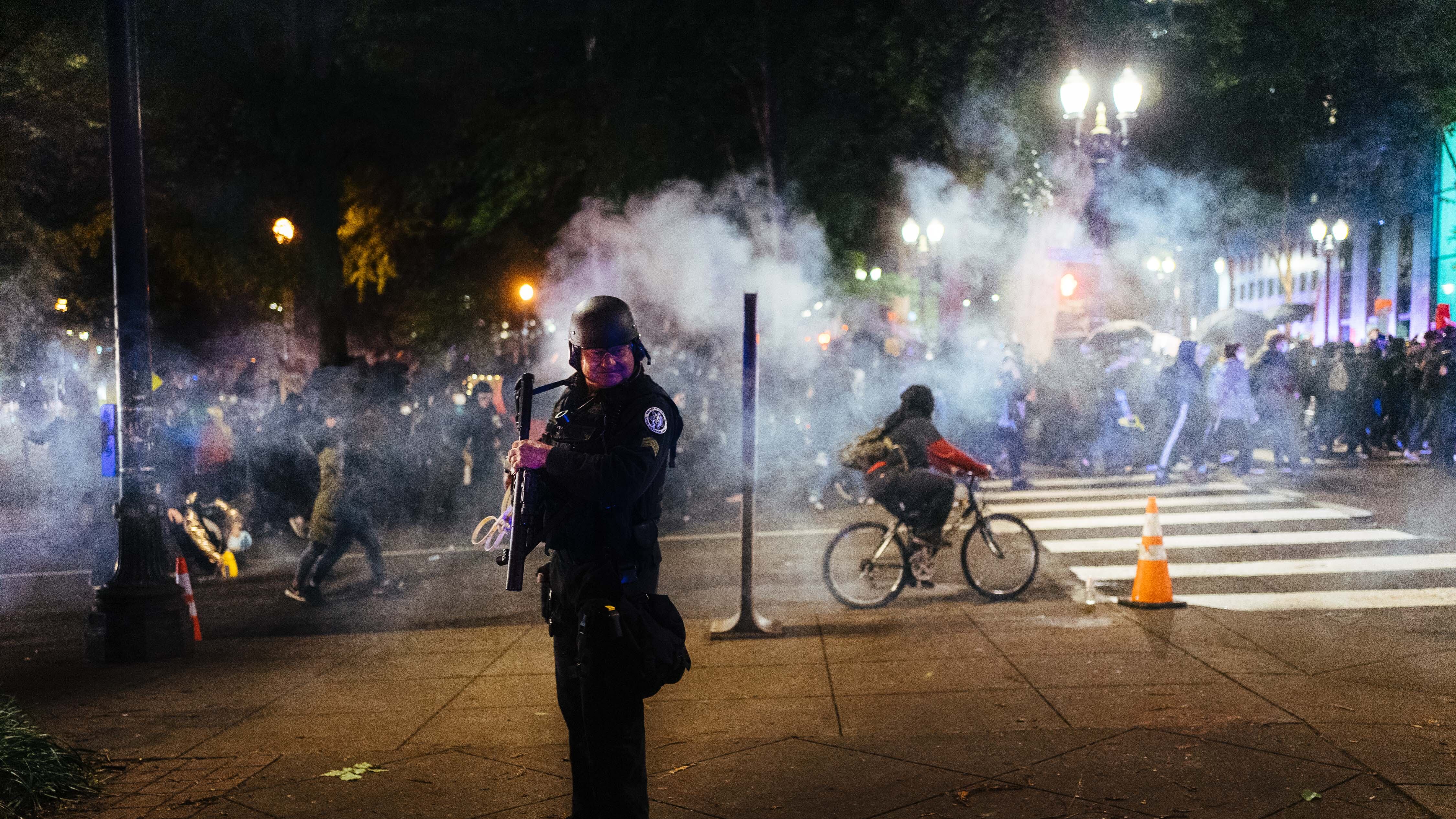Portland's nightly uprising against police killings continues to be a tale of two protests: a larger, pacific march of solidarity against racism, and a smaller group that confronts riot cops along a chain-link fence.
On Sunday night, Portland police again used force to scatter the smaller group, deploying pepper balls, smoke, stun grenades and a wall of officers to clear the fence around the Multnomah County Justice Center.
A crowd of hundreds began standing at the fence around 8 pm, holding umbrellas to guard against smoke and sticking glazed doughnuts between the chain links to taunt officers. Minutes after midnight, police deployed explosives—thundering booms that could be heard on both sides of the Willamette River.
Videos showed protesters fleeing downtown as officers advanced. For a second consecutive night, police appeared to use less tear gas than they did last week—but were also seen aggressively arresting people who didn't comply with their orders, and tackling some. Protesters yelled obscenities at cops as they fled.

Police advanced from the north side of Chapman Square toward the protest, and pushed demonstrators west. After a standstill, with reporters and photojournalists in the front of the crowd, police charged down Southwest Main Street and fired stun grenades toward retreating protesters. They then began pushing the crowd toward West Burnside Street, firing flash-bangs and walking toward the remaining group.
Some protesters attempted to build a barricade using potted plants, but broke the pots by moving them. One officer stumbled over the barricade as he advanced.
Police said the Elk Fountain on Main Street was briefly set on fire, but the flames went out on their own.

But the melee was not the only protest Sunday.
Earlier in the evening, leaders of Portland's uprising against racial injustices voiced a list of tangible demands of Portland City Hall, amid a crowd of protesters standing shoulder to shoulder in front of Revolution Hall on Southeast Stark Street.
By 6 pm, the area surrounding the building was overflowing with supporters. Volunteers set up tents and handed out meals, Salt & Straw ice cream, snacks, water and ear plugs. Portland Fire & Rescue and EMTs also had their own station. It was their first night at the protests.
Speakers debuted an ambitious but concrete agenda for police reforms in Portland. The 11 demands include several items now being proposed by City Commissioners Jo Ann Hardesty and Chloe Eudaly—including the complete defunding of two Portland police units, the Transit Police and the Gun Violence Reduction Team—as well as a call to reduce Multnomah County's jails budget and disarm campus police at Portland State University.
"This is bigger than any single person," protest leader Devin Boss said. "As long as we band together, we become a strong force that can't be stopped."
Then the group began marching—starting at Stark and 13th Avenue, they walked and chanted more than 2 miles north to Irving Park.
As protesters walked through neighborhoods in Northeast Portland, people came out of their homes and onto their porches to watch and support the protest. Others stood along sidewalks holding signs. Dozens of residents from the retirement community at Holladay Park Plaza banged on pots and pans and waved to the crowd from their patios while the crowd waved back.
Once they reached Irving Park, the crowd knelt in solidarity for nine minutes to honor the death of George Floyd, a black man whose killing by Minneapolis police started a national uprising. The crowd chanted, "I can't breathe!"—among Floyd's last words.
"If that was hard for you to raise your hand and say those words for that long, think about that man," a speaker said. "That's what we're here for."

Boss encouraged the audience to watch the video of Floyd's death.
"Watch the video, feel a fraction of that pain we feel," Boss said. "I want you to cry. I want you to hurt. Gain some empathy, some perspective."
At 9:15 pm, the hip-hop artist Swiggle Mandela shared stories of friends and family who have been assaulted by the Portland police and then performed a song for the audience. This is the largest crowd he's had the chance to perform for, he said.
The final speaker of the night introduced herself as Kinsey from Portland Civil Rights Collective. "It's an honor to be here at this point in history," she said. "We're going down in the books, baby."
Speakers hinted at big plans for upcoming protests but offered no specifics.
"This is not stagnant. We're disrupting traffic in different areas," one speaker said. "We want to be in different parts of the city to stress out the cops. Because if were all over the place, then they've got to be all over the place. It's strategic."

